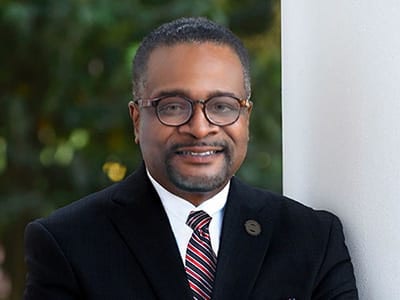A new initiative to train the next generation of HBCU presidents received major support this week, with a $1 million grant from the Chan Zuckerberg Initiative (CZI).
The Executive Leadership Institute (ELI)—housed at Clark Atlanta University (CAU)—received the funds, as part of the first round of racial equity grants disseminated by the Initiative started by Facebook founder Mark Zuckerg and his wife, Dr. Priscilla Chan.
 Dr. George T. French Jr.
Dr. George T. French Jr.The inaugural ELI cohort of about 20 candidates—or Legacy Fellows—will be announced later this spring. Qualified industry leaders from higher education to Wall Street were invited to apply with an interest in running HBCUs. Starting in June and ending in December, the immersive leadership program will last six months, first as a virtual program and potentially in person later.
“The Executive Leadership Institute at Clark Atlanta University is at the forefront of addressing issues of diversity and inclusion. Gifts like this help to sustain the future of HBCUs which depend on the quality and training of those who will lead them,” said CAU President Dr. George T. French Jr., adding that the grant will enable ELI to develop “strong executive leaders who serve as change agents ultimately preparing African-American students to leave their respective HBCUs educated, and equipped to be globally competitive and change the world.”
The grant to ELI is part of a of a five-year, $500 million investment CZI announced in December 2020 to support organizations leading the way to advance racial equity, diversity and inclusion. According to CZI officials, grant recipients are led by, or work in support of, communities of color and focus on cultivating leaders, tackling outcome disparities, shaping policies, and advancing institutional change.
“I want to commend Dr. Priscilla Chan and Ms. Belinda Stubblefield of CZI for their work to provide equitable opportunities for Historically Black Colleges and Universities,” said Dr. Phyllis Worthy Dawkins, former president of Bennett College and Project Director of the HBCU ELI at CAU. “The funds will be used to implement the HBCU Executive Leadership Institute at Clark Atlanta University, which is uniquely designed to provide competencies, skills, and dispositions that aspiring Presidents and executive level administrators need to be successful.”
HBCUs have gained attention in recent months with the country’s racial reckoning and the pandemic’s outsize toll on minority, low-income students, many of whom enroll at HBCUs. But these institutions also face unique leadership challenges to their longevity that ELI aims to address. An HBCU president’s average stay is just over three years. But across all four-year colleges, the average president’s tenure is seven years. HBCUs often run on thin budgets and low alumni giving. The pandemic worsened that financial instability for many institutions.
While CZI has made key investments since its founding five years ago, the organization has embarked on an enterprise-wide effort to more consistently and systematically apply a racial equity lens to their grantmaking.
“Embedding a racial equity lens across CZI’s philanthropic areas of focus will help us drive the impact and results that we are all working to achieve,” said Belinda Stubblefield, CZI’s Head of Diversity, Equity, and Inclusion. “As part of this critical work, we are engaging changemakers, community members, and movement builders with deep expertise and lived experience as partners, helping to shape our strategies and actions. We are dedicated to this work for the long term.”
By the end of this year, CZI will award $30 million in grants to organizations working to advance racial equity, diversity and inclusion.
Walter Hudson can be reached at [email protected]















